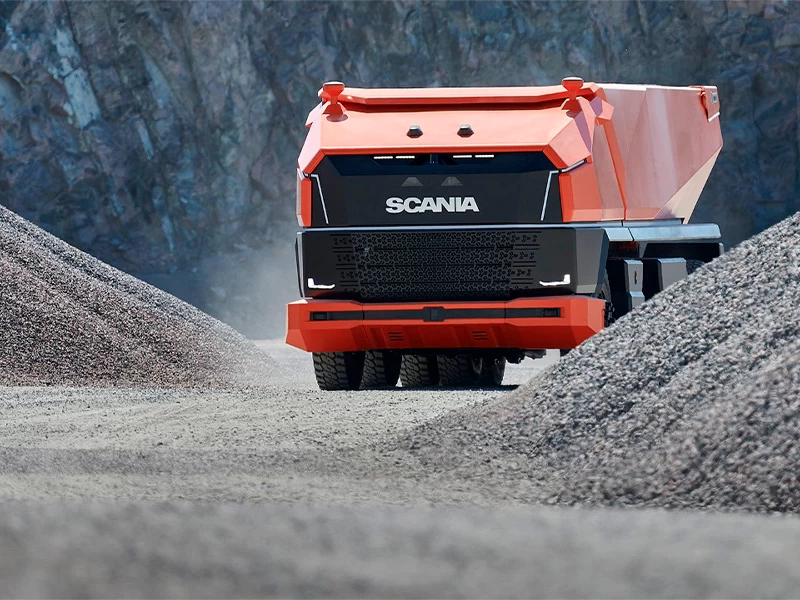Scania presented the concept of an autonomous truck
04.10.2023

The Swedish manufacturer of commercial vehicles, Scania, has unveiled a conceptual model of its future autonomous transportation vehicle, the Scania AXL, as reported by the "Trucks and Roads" portal on Wednesday, September 26th. According to the company, this freight concept car is designed for use in quarries, mines, and large closed construction sites—conditions that are optimal for the use of fully autonomous transport. According to the developers, the use of such technology will enable transportation operators to streamline the cargo transportation process, enhance the economic efficiency of their operations, and reduce adverse environmental impacts.
Scania explained that the design of this conceptual model is based on the proven modular principle, which the company's engineers follow when developing innovative technology. In the construction of the Scania AXL, there is no traditional driver's cabin; it is replaced by a special intelligent front module. Among other technical features, it is worth noting the engine of the concept car, which, according to the developers, primarily runs on renewable biofuels. This factor allows minimizing the negative impact of the vehicle on the environment.
Scania also emphasized that, in terms of technical characteristics and design features, the model is optimally suited for heavy-duty operations in the construction and mining sectors. "With the conceptual truck Scania AXL, we are taking a significant step forward in creating intelligent transport systems of the future, where autonomous vehicles will play a significant role," commented Henrik Henriksson, President and CEO of Scania, on the presented development.
The Swedish manufacturer has been working on autonomous transportation for several years. For example, in February 2018, the company announced the successful completion of another stage of testing its Platooning technology. It's worth adding that Scania's current concept essentially duplicates similar developments by other manufacturers. For instance, Volvo Trucks announced in December of the previous year the launch of test transportation between quarries and a seaport in Norway using autonomous Volvo FH trucks in collaboration with Brönnöy Kalk AS. In June of this year, the experimental autonomous electric truck, Vera, from the same manufacturer, began testing cargo transportation in the Swedish port of Gothenburg.
The Swedish manufacturer of commercial vehicles, Scania, has unveiled a conceptual model of its future autonomous transportation vehicle, the Scania AXL, as reported by the "Trucks and Roads" portal on Wednesday, September 26th. According to the company, this freight concept car is designed for use in quarries, mines, and large closed construction sites—conditions that are optimal for the use of fully autonomous transport. According to the developers, the use of such technology will enable transportation operators to streamline the cargo transportation process, enhance the economic efficiency of their operations, and reduce adverse environmental impacts.
Scania explained that the design of this conceptual model is based on the proven modular principle, which the company's engineers follow when developing innovative technology. In the construction of the Scania AXL, there is no traditional driver's cabin; it is replaced by a special intelligent front module. Among other technical features, it is worth noting the engine of the concept car, which, according to the developers, primarily runs on renewable biofuels. This factor allows minimizing the negative impact of the vehicle on the environment.
Scania also emphasized that, in terms of technical characteristics and design features, the model is optimally suited for heavy-duty operations in the construction and mining sectors. "With the conceptual truck Scania AXL, we are taking a significant step forward in creating intelligent transport systems of the future, where autonomous vehicles will play a significant role," commented Henrik Henriksson, President and CEO of Scania, on the presented development.
The Swedish manufacturer has been working on autonomous transportation for several years. For example, in February 2018, the company announced the successful completion of another stage of testing its Platooning technology. It's worth adding that Scania's current concept essentially duplicates similar developments by other manufacturers. For instance, Volvo Trucks announced in December of the previous year the launch of test transportation between quarries and a seaport in Norway using autonomous Volvo FH trucks in collaboration with Brönnöy Kalk AS. In June of this year, the experimental autonomous electric truck, Vera, from the same manufacturer, began testing cargo transportation in the Swedish port of Gothenburg.
Your request has been sent successfully. Our specialists will contact you as soon as possible.